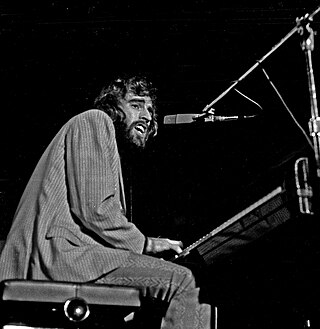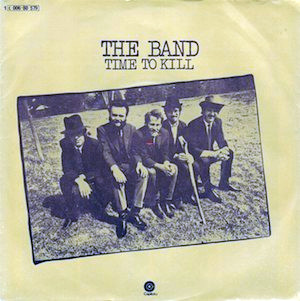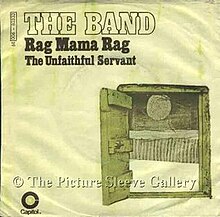
The Band was a Canadian-American rock band formed in Toronto, Ontario, in 1967. It consisted of Canadians Rick Danko, Garth Hudson, Richard Manuel, Robbie Robertson, and American Levon Helm. The Band combined elements of Americana, folk, rock, jazz, country, influencing musicians such as George Harrison, Elton John, the Grateful Dead, Eric Clapton and Wilco.

Richard George Manuel was a Canadian musician, singer, and songwriter, best known as a pianist and one of three lead singers in the Band, for which he was posthumously inducted into the Rock and Roll Hall of Fame in 1994.
"This Wheel's on Fire" is a song written by Bob Dylan and Rick Danko. It was originally recorded by Dylan and the Band during their 1967 sessions, portions of which comprised the 1975 album, The Basement Tapes. The Band's own version appeared on their 1968 album, Music from Big Pink. Live versions by the Band appear on their 1972 live double album Rock of Ages, as well as the more complete four-CD-DVD version of that concert, Live at the Academy of Music 1971, and the 2002 Box Set of The Last Waltz.

"Acadian Driftwood" is a song by the Band. It was the fourth track on their sixth studio album Northern Lights – Southern Cross (1975), written by member Robbie Robertson. Richard Manuel, Levon Helm and Rick Danko trade off lead vocals and harmonize on the chorus.
"Look Out Cleveland" is the title of the Robbie Robertson-written song on The Band's self-titled album, also known as The Brown Album. The song begins with a boogie-woogie blues riff by pianist Richard Manuel followed by lead singer Rick Danko warning -- "Look out Cleveland, storm is coming through, And it’s runnin’ right up on you". The song's reference is presumably to Cleveland, Ohio, but Cleveland, Texas has also been suggested.

"Stage Fright" is the title track of the Band's third album, Stage Fright. It features Rick Danko on lead vocals and was written by Robbie Robertson. According to author Barney Hoskyns, Robertson originally intended it to be sung by Richard Manuel but it became clear that the song was better suited to Danko's "nervous, tremulous voice."
"It Makes No Difference" is a song written by Robbie Robertson and sung by Rick Danko that was first released by The Band on their 1975 album Northern Lights – Southern Cross. It has also appeared on live and compilation albums, including the soundtrack to the film The Last Waltz. Among the artists that have covered the song are Solomon Burke, My Morning Jacket, The Icicle Works, Trey Anastasio, Over the Rhine and Eric Clapton.

"The Shape I'm In" is a song by The Band, first released on their 1970 album Stage Fright. It was written by Robbie Robertson, who did little to disguise the fact that the song's sense of dread and dissolution was about Richard Manuel, the song's principal singer. It became a regular feature in their concert repertoire, appearing on their live albums Rock of Ages, Before the Flood, and The Last Waltz. Author Neil Minturn described the song as "straightforward rock." Along with "The Weight," it is one of the Band's songs most performed by other artists. It has been recorded or performed by Bo Diddley, The Good Brothers, The Mekons, The Pointer Sisters, She & Him, Marty Stuart and Nathaniel Rateliff and the Night Sweats.
"Sleeping" is a song by The Band, first released on their 1970 album Stage Fright. It was also released as the B-side to the "Stage Fright" single. It was co-written by Robbie Robertson and Richard Manuel. This and “Just Another Whistle Stop” are the only two songs Manuel receives credit for on the album. Music critic Barney Hoskyns rates it as "one of Richard [Manuel's] liveliest performances" and "one of The Band's most intricate arrangements." The Band never featured the song on a live album.
"Daniel and the Sacred Harp" is a song written by Robbie Robertson that was first released by The Band on their 1970 album Stage Fright. It has been covered by such artists as Barrence Whitfield.
"When You Awake" is a song written by Robbie Robertson and Richard Manuel that was first released on The Band's 1969 self-titled album The Band. A live performance was included on the Bob Dylan and The Band live album Before the Flood.

"Whispering Pines" is a song written by Richard Manuel and Robbie Robertson that was first released by The Band on their self-titled 1969 album The Band. It was released as a single in France, backed by "Lonesome Suzie".

"Ophelia" is a song written by Robbie Robertson that was first released by the Band on their 1975 album Northern Lights – Southern Cross. It was the lead single from the album. It has also appeared on several of the group's live and compilation albums, and has been covered by such artists as Vince Gill and My Morning Jacket.
"Across the Great Divide" is a song written by Robbie Robertson. It was first released by The Band on their 1969 album The Band and was subsequently released on several live and compilation albums. According to music critic Barney Hoskyns, it was one of several songs that contributed to The Band being something of a concept album about the American South.

"Time to Kill" is a song written by Robbie Robertson that was first released by the Band on their 1970 album Stage Fright. It was also released as a single off the album, backed with the more famous "The Shape I'm In" and, although it failed to reach the Top 40 in the United States, it peaked at #13 in the Netherlands. It has also been featured on several Band compilation and live albums.
"Jemima Surrender" is a song written by Levon Helm and Robbie Robertson. It was first released on the Band's self-titled album in 1969. Usual Band drummer Levon Helm played guitar and sang the lead vocal while usual Band pianist Richard Manuel played drums. The song's lasciviousness helped inspire Naomi Weisstein to form the Chicago Women's Liberation Rock Band.
"The W.S. Walcott Medicine Show" is a song written by Robbie Robertson that was first released on the Band's 1970 album Stage Fright. It was also frequently performed in the group's live sets and appeared on several of their live albums. Based on Levon Helm's memories of minstrel and medicine shows in Arkansas, the song has been interpreted as an allegory on the music business. Garth Hudson received particular praise for his tenor saxophone playing on the song.
"The Unfaithful Servant" or "Unfaithful Servant" is a song written by Robbie Robertson that was first released by The Band on their 1969 album The Band. It was also released as the B-side of the group's "Rag Mama Rag" single. It has also appeared on several of the Band's live and compilation albums.
"4% Pantomime" is a song written by Robbie Robertson and Van Morrison. It was first released on the Band's 1971 album Cahoots.








